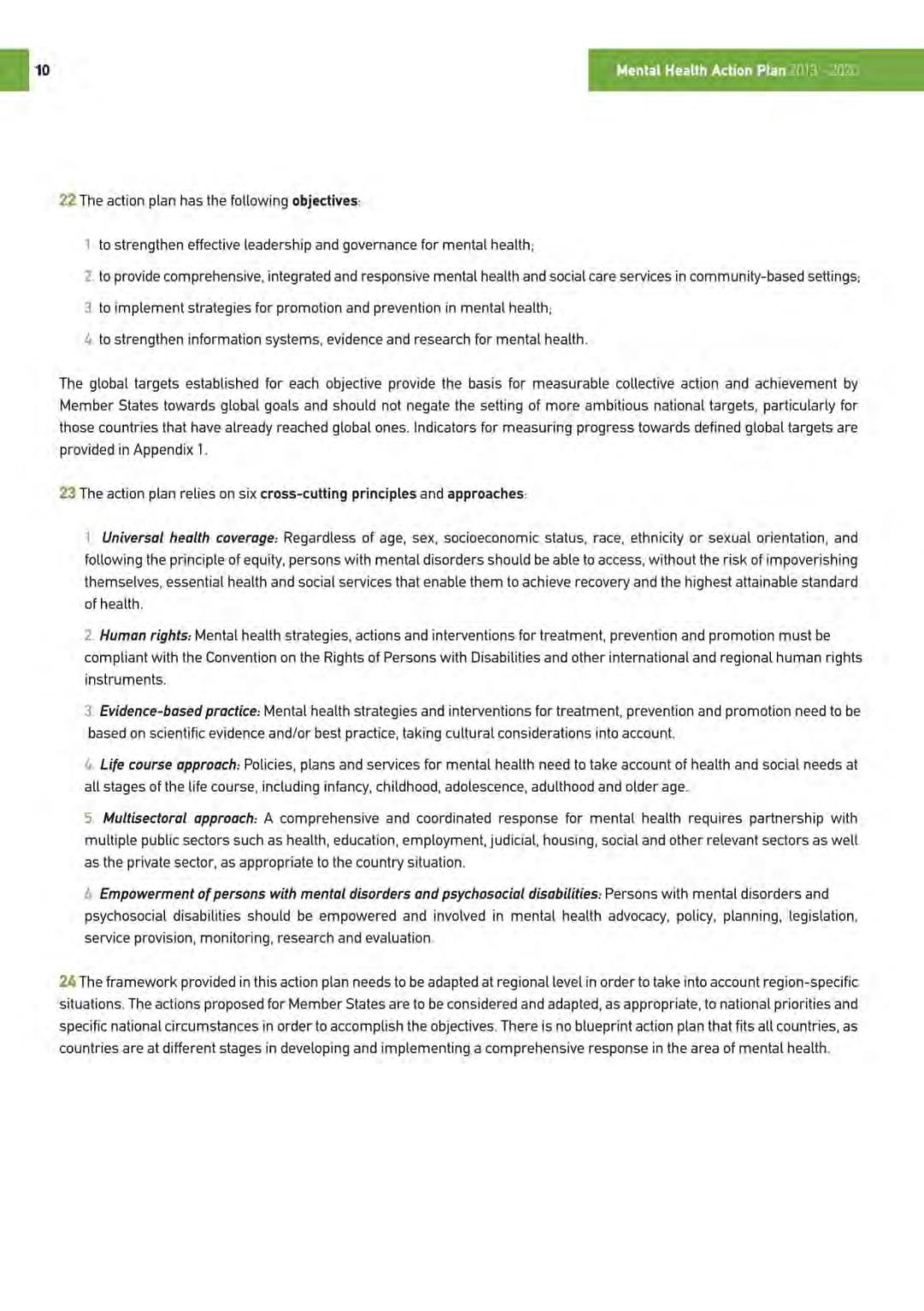正在加载图片...

10 Mental Health Action Plan 20132020 22 The action plan has the following objectives: 1 to strengthen effective leadership and governance for mental health 2.to provide comprehensive.integrated and responsive mental health and social care services in community-based settings: 3 to implement strategies for promotion and prevention in mental health: 4 to strengthen information systems,evidence and research for mental health. The global targets established for each objective provide the basis for measurable collective action and achievement by Member States towards global goals and should not negate the setting of more ambitious national targets,particularly for those countries that have already reached global ones.Indicators for measuring progress towards defined global targets are provided in Appendix 1. 23 The action plan relies on six cross-cutting principles and approaches 1Universal health coverage:Regardless of age,sex,socioeconomic status.race.ethnicity or sexual orientation,and following the principle of equity.persons with mental disorders should be able to access,without the risk of impoverishing themselves,essential health and social services that enable them to achieve recovery and the highest attainable standard of health. 2.Human rights:Mental health strategies,actions and interventions for treatment,prevention and promotion must be compliant with the Convention on the Rights of Persons with Disabilities and other international and regional human rights instruments. 3 Evidence-based practice:Mental health strategies and interventions for treatment,prevention and promotion need to be based on scientific evidence and/or best practice,taking cultural considerations into account. Life course opproach:Policies,plans and services for mental health need to take account of health and social needs at all stages of the life course,including infancy,childhood,adolescence,adulthood and older age. 5.Multisectoral approach:A comprehensive and coordinated response for mental health requires partnership with multiple public sectors such as health,education,employment,judicial,housing,social and other relevant sectors as well as the private sector,as appropriate to the country situation. Empowerment of persons with mental disorders and psychosocial disabilities:Persons with mental disorders and psychosocial disabilities should be empowered and involved in mental health advocacy.policy,planning.legislation. service provision,monitoring.research and evaluation. 24 The framework provided in this action plan needs to be adapted at regional level in order to take into account region-specific situations.The actions proposed for Member States are to be considered and adapted,as appropriate,to national priorities and specific national circumstances in order to accomplish the objectives.There is no blueprint action plan that fits all countries,as countries are at different stages in developing and implementing a comprehensive response in the area of mental health.10 Mental Health Action Plan :'UI < J _'.: ! 22 The action plan has the following objectives: 1 10 strengthen effective leadership and governance for menial health: 2 to provide comprehensive. integrated and responsive mental health and sociaL care services in community-based settings; 3 to implement strategies for promotion and prevention in menial health; 4 to strengthen information systems, evidence and research for mental health. The global targets established lor each objective provide the basis for measurable collective action and achievement by Member Slates towards global goals and should not negate the selling of more ambitious national targets. particularly for those countries thai have already reached global ones. Indicators for measuring progress towards defined global targets are provided in Appendix 1. 23 The action plan relies on six cross-cutting principles and approaches: 1 Universal health coverage, Regardless of age, sex, socioeconomic status, race, ethnicity or sexual orientation, and following the principle of equity, persons with mental disorders should be able to access, without the risk of impoverishing themselves, essential health and social services that enable them to achieve recovery and the highest attainable standard of health. 2. Human rights: Mental health strategies, actions and interventions for treatment, prevention and promotion must be compliant with the Convention on the Rights of Persons with Disabilities and other international and regional human rights instruments. 3. Evidence-based practice: Mental health strategies and interventions for treatment, prevention and promotion need to be based on scientific evidence and/or best practice, taking cultural considerations into account. 4 Life course approach, Policies, plans and services for mental health need to take account of health and social needs at all stages of the life course, including infancy, childhood, adolescence, adulthood and older age. 5 Muitisectoral approach: A comprehensive and coordinated response for mental health requires partnership with multiple public sectors such as health, education, employment, judicial, housing, social and other relevant sectors as well as the private sector, as appropriate to the country situation. 6 Empowerm ent of persons with mental disorders and psychosocial disabilities: Persons with mental disorders and psychosocial disabilities should be empowered and involved in mental health advocacy, policy, planning, legislation, service provision, monitoring, research and evaluation. 24 The framework provided in this action plan needs to be adapted at regional level in order to take into account region-specific situations. The actions proposed for Member States are to be considered and adapted, as appropriate, to national priorities and specific national circumstances in order to accomplish the objectives. There is no blueprint action plan that fils all countries, as countries are at different stages in developing and implementing a comprehensive response in the area of mental health